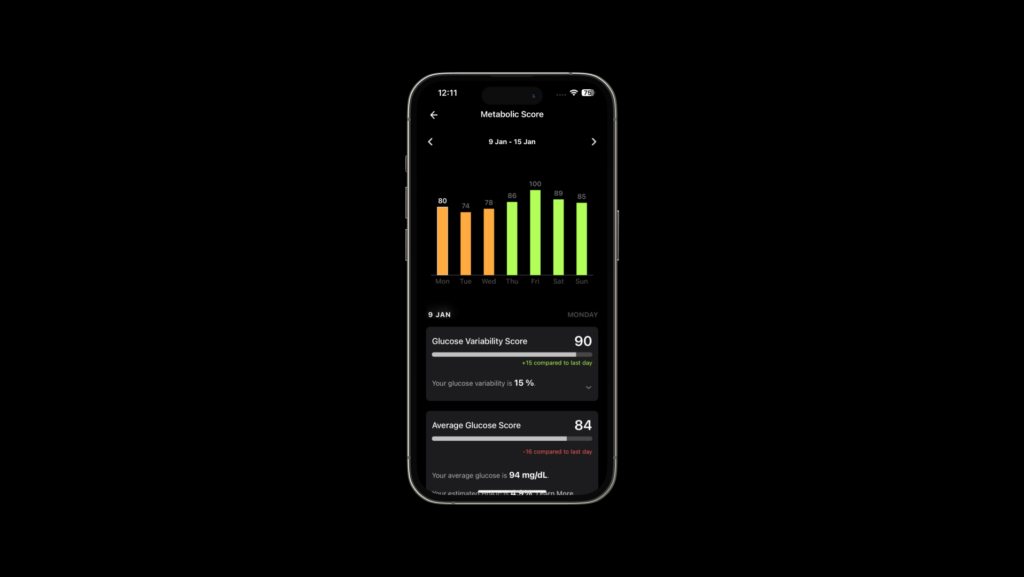What is Metabolism?
Even while at rest, every human being is kept alive by a chemical process in each cell of the body called metabolism. Metabolism is the term used to describe all chemical reactions that maintain the living state of an organism.
It can be divided into two categories: catabolism, which is the breakdown of molecules to obtain energy, and anabolism, which is the synthesis of all compounds needed by the cells.
What is Metabolic Health?
What is Metabolic Health?
aMetabolism is essential to our biological functioning since it provides the energy we need to breathe, circulate blood, grow and repair cells and so on.
Though metabolism is commonly considered to be related to weight loss or gain, there are various other factors that contribute to metabolic health.
According to a study published in the journal Metabolic Syndrome and Related Disorders, metabolic health means having optimal levels of blood sugar, blood pressure, triglycerides, high-density lipoprotein (HDL) cholesterol and waist circumference, without the use of medications.
What is Metabolic Testing?
There are a variety of medical procedures and tests that can serve as indicators of metabolic health. Each of these tests provides information about a key element of your metabolism.
From aerobic capacity and the rate of fat burning to the functioning of metabolism within cells, the information gained from these tests can be used for medical purposes, or to tailor a better workout and diet plan for your body.

Why Metabolic Health Testing is Important?
Metabolic health and related factors are closely associated with an individual’s risk of developing insulin resistance, cardiovascular disease, diabetes, stroke and other health conditions.
Going beyond metrics like weight, metabolic testing can help you to be aware of the risks to your health and is also an effective way to see how well your body’s systems are functioning.
A number of studies have shown that even individuals who are of normal weight can develop diseases usually correlated with obesity. Hence, it’s vital to use testing and the biomarkers that metabolic testing provides to obtain actionable insights about an individual’s body, which can then lead to recommendations for a healthier lifestyle or medical intervention.
Where To Get Metabolic Testing Done?
Where To Get Metabolic Testing Done?
aMetabolic testing was traditionally done in medical environments such as hospitals, labs or clinics.
However, over the past few years, some of these tests are also offered at certain health clubs, gyms or similar facilities.
Since some kinds of metabolic testing do not require immediate analysis, they can be carried out at home.
Most at-home metabolic tests look at hormone levels that can affect metabolism, such as cortisol, insulin, progesterone, thyroid hormone triiodothyronine (T3), thyroid stimulating hormone and others.
These tests typically involve sending a saliva sample or swab collected at home to a lab for analysis.
Types of Metabolic Tests
The different kinds of metabolic tests used to measure different indicators of your metabolism are as follows:
- Resting Metabolic Rate (RMR):Testing this aspect of metabolism shows the estimated number of calories your body burns while at rest (not exercising or physically engaged). RMR measures how much energy is required by your body at rest and is useful in tailoring an exercise and diet program as per the needs of your body type. It also helps to determine energy balance and the calorie intake recommended for your body, and provides the most accurate picture of your resting energy expenditure (REE), which can help you calculate the number of calories required to maintain weight, lose weight or add muscle mass.
- Maximum Volume of Oxygen (VO2 Max):Also known as aerobic capacity, this test provides information about your body’s ability to effectively use oxygen during exercise or physical activity. By measuring the oxygen used by your body at various levels of intensity, it can be useful in identifying the ‘zones’ or heart rates which are optimal for burning calories, improving cardiovascular health and overall fitness levels.
- Lactate Threshold Test:Your lactate threshold is the point at which lactic acid builds up in the blood more quickly than it can be removed during exercise, which leads to muscle fatigue. It’s another way to determine metabolic activity and is often used for athletes.
- Health Parameters:Although they’re not just used to test metabolism, parameters such as blood pressure, triglycerides, HDL cholesterol or waist circumference can also be part of metabolic testing.
- Comprehensive Metabolic Panel (CMP):What is a comprehensive metabolic panel?, also known as Chem-14, a blood test that has 14 different measurements. Along with metabolism, it is also used to assess liver function, kidney function, nutrient levels and similar indicators to ensure that the metabolic process is normal. It can also serve as a broad assessment of physical well-being or a tool for diagnosis or screening of a patient.
A CMP includes 14 measurements that are conducted with the same blood sample and should fall ideally within the prescribed normal reference range:
- Glucose – level of blood sugar, which might be elevated due to metabolic problems like diabetes or pre-diabetes.
- Calcium – a critical mineral that is important for bone health and the contraction of muscles, as well as nerve signaling, heart function and other uses in the body. Low calcium levels could indicate kidney, liver, bone or thyroid problems, among others.
- Sodium – an essential electrolyte (minerals that promote healthy fluid levels and the balance of acid and bases in the body). Sodium levels are tied to proper functioning of the muscles, nerves and circulation. Abnormal sodium levels are connected to diet but could also indicate issues with the kidneys (which regulate it), dehydration or high blood pressure.
- Potassium – another key electrolyte present in all cells which is tied to metabolism.
- Bicarbonate – an electrolyte that is reflective of the levels of carbon dioxide (CO2) in your blood.
- Chloride – another electrolyte that is essential to enable a number of bodily processes, in conjunction with sodium, potassium and bicarbonate.
- Blood urea nitrogen (BUN) – a measurement of urea nitrogen levels, a waste material that is filtered by the kidneys. High levels of this indicate dehydration, kidney disease or heart problems.
- Creatinine – another waste product that the kidneys filter from the blood. It is a by-product of normal muscle activity which can indicate dehydration, malnutrition, or kidney disease.
- Albumin – a protein produced in the liver which transports nutrients across the body and keeps fluid from leaking out of blood vessels.
- Total protein – a measure of the sum of albumin and globulins, which are proteins related to blood vessel and immune function.
- Alkaline phosphatase (ALP) – an enzyme found in tissues throughout the body, most often concentrated in the liver and bones.
- Aspartate aminotransferase (AST) is an enzyme present in the liver and other tissues of the body.
13. Alanine aminotransferase (ALT) and Aspartate Aminotransferase (AST) – enzymes present in the liver and other tissues.
- Bilirubin – a waste product that is produced from the breakdown of red blood cells, which is another key indicator of liver function.
In many cases, you may simply be recommended a basic metabolic panel (BMP), a metabolic blood test that only measures 5 key indicators from the list above – the levels of glucose, calcium, electrolytes, BUN and creatinine.
- Other tests: Many routine blood tests also offer results that can be indicative of metabolic health, with parameters such as triglycerides, blood pressure and HDL cholesterol. Hormone tests can also reveal insights about weight gain/loss, underlying health problems like thyroid impairment and metabolic functioning.
Things to keep in mind before Metabolic tests
Before a metabolic test, there are a few things to keep in mind, depending on the kind of test and the reasons for taking it.
- Most tests should be conducted after telling the doctor or practitioner about any medications or dietary supplements that may influence the results.
- Before a CMP or BMP, you usually need to fast for 10-12 hours for a more accurate measure of blood sugar and fasting sugar levels.
- While at-home tests can provide a broad indication of metabolic health, a CMP or lab testing should be done in consultation with a doctor if there is any doubt about the results.
- Interpreting the results should be done in conjunction with your doctor or a medical professional.
Conclusion
Considering how important our metabolic health is to so many of our vital functions and overall well-being, metabolic testing can be an important tool for routine check-ups, diagnosis or screening.
Based on the results, you can not only identify any potential health problems but also understand your metabolism better. Using these findings to adjust to a better diet, exercise routine or other factors can help to ensure your metabolism is functioning properly, and be a powerful tool for health, fitness and weight management.
References
- https://www.sciencedirect.com/topics/medicine-and-dentistry/metabolism
- https://www.liebertpub.com/doi/10.1089/met.2018.0105
- https://www.healthline.com/health/what-is-a-metabolism-test-and-can-you-use-it-for-weight-loss-and-fitness
- https://ultrahuman.com/blog/how-to-improve-your-metabolic-health/
- https://www.medicalnewstoday.com/articles/at-home-metabolic-tests#summary








